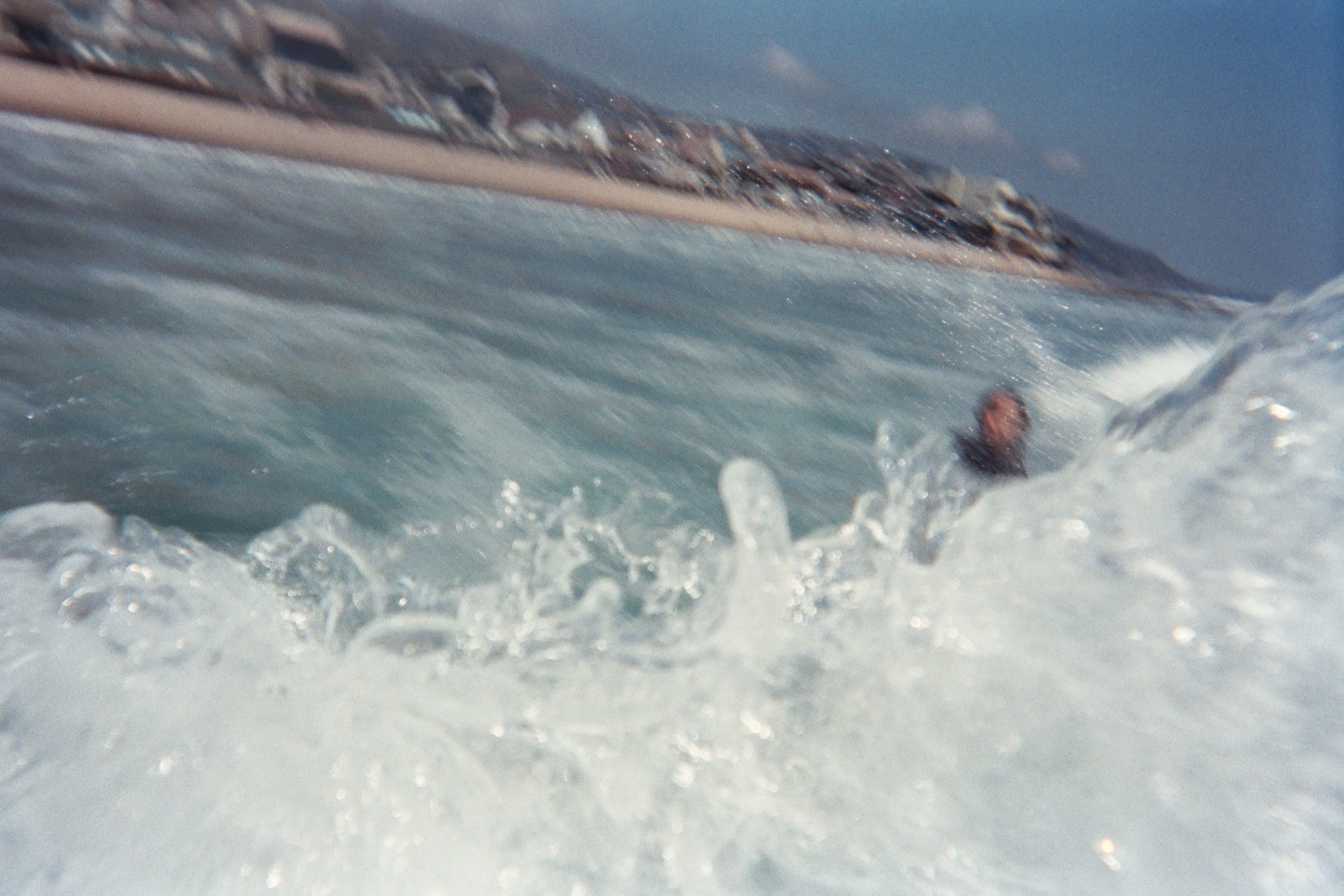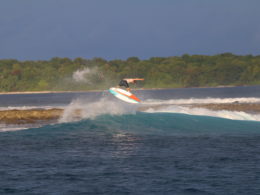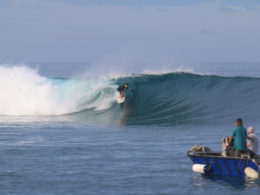Fernando Aguerre’s Olympic push has more in common with the 1820s Calvinist missionary suppression of surfing in Hawai’i than he would ever admit. In the 1820s, missionaries arriving in Hawai’i disapproved of surfing’s exposed skin, excess of leisure, and commingling of sexes. The hundred years following Calvinist arrival devastated the Hawaiian population and culture through European introduction of disease, technology, and religion. Olympic-gold-medal swimmer Duke Kahanamoku suggested that surfing be included in the 1920 Olympics. Another hundred years later and Fernando Aguerre, president of the International Surfing Association (ISA), seized the opportunity of the Duke’s suggestion. Aguerre became the person who brought surfing into the Olympics.
Aguerre accrued the influence to ensure that the rescheduled 2020 Tokyo Summer Olympics would be the first Olympic games to feature surfing by founding the Reef brand in 1985. While cultivating a brand that eventually sold for more than $139 million, Aguerre also became president of the ISA and something of a politician. Between the multi-million-dollar business of advertising thongs with thongs and presiding over the ISA, Aguerre became a powerful figure in surfing while remaining largely behind the scenes.
Dragging Aguerre from behind the scenes to center stage requires reading interviews where Aguerre’s self-conception can be investigated despite the superficial function of building hype. Aguerre positions himself as a humanitarian working not only for the betterment of surfing, but also of society. To demonstrate the selflessness of his work, Aguerre articulates a lean, reimagined past, present, and future for surfing. Aguerre’s power within the industry dictates that “future surf culture” may grow to resemble Aguerre’s manicured ideal. The problematic regression to surfing’s traumatic past is evident in interviews wherein Aguerre projects a vision of the surf industry whose economics steamroll expression, activism, and culture.
Aguerre’s political savvy manifests as he avoids bogging out when responding to sketchy questions by ignoring them, instead massaging history and distracting with an air-reverse toward the positive. Asked whether surfing experienced an Olympic inclusion backlash akin to skateboarding, whose countercultural elements spoke out against skating entering the Olympics, Aguerre responds: “Tony Hawk, the most famous skateboarder in history, is fully supportive, and I think that in some quarters there is resistance but we haven’t had it in surfing. The father of modern surfing was a very famous Olympian, a three-times swimming gold medalist, and he has said that surfing should be an Olympic sport… now it is quite clear that the surfing population sees this as a step forward.” While modern skateboarding may be more ‘counter-cultural’ than surfing, little else verges on truth in Aguerre’s response.
On first shake, it seems Aguerre is using Tony Hawk’s endorsement of skating to disprove the interviewer’s question. Like: “Tony is down, therefore, foolish interviewer, the sport of skateboarding is obvs cool with the Olympics.” Aguerre is speaking of culture as belonging to a ‘majority’ of elites, rather than a numerical majority; that feels cruel and dangerous. Tony Hawk may be the most famous skater ever, but his opinion does not negate the reality of a grass-roots backlash to skateboarding’s Olympic inclusion.
A second reading of Aguerre’s response illuminates the possibility that Aguerre used Hawk as a check turn to smooth over a bumpy section before cracking the lip with his claim that “just like skating, there may be a few in opposition, but really the surfing community is happy about this.” John-John Florence, Kanoa Igarashi, and Fernando Aguerre should be happy about surfing’s inclusion, because they stand to gain greater visibility, thereby increasing earning potential. However, increased visibility yielding increased crowds is one reason the surf majority may prefer to leave surfing out of the Olympics, despite Aguerre’s purveyance of stoke. Dude muscles his belief that the surf community wants surfing in the Olympics to the point that he unilaterally aligns skateboarding with his unfounded claim. Fernando Aguerre threw some extra plates on the bar and dead-lifted skateboarding’s Olympic enthusiasm on behalf of surfers everywhere (you’re welcome, skating).
When Aguerre shifts his focus to the industry, he finds a rhythm and his answers lose their choppiness. Asked whether becoming part of the Olympics has been good for the surfing community, he answers: “I think surfing is more popular now than it has ever been. And this has been an ongoing thing – it’s just cool that people like it, and we see a lot of mainstream brands and companies using surfing as a vehicle, in telecommunications, car companies, all kinds of companies getting into the sport.” The trouble with that otherwise slick answer is: Aguerre wasn’t asked about the health of the industry. Aguerre cut back to money in response to a question about community. Community is not an economic term. Like Aguerre’s reference to ultra-famous participant opinions, it again becomes clear that Aguerre is not a man of the people; he is a man of the elite. Neither potential athletes nor investing brands represent the interests of participants. Therefore, those groups cannot represent the whole of the surf community.
Surf iconography, as seen in commercials, film, and television, presents the sport as a bastion of freedom and individualism. The sport inhabits a similar space in the popular imagination as Hollywood cowboys or the Marlboro Man. There is even a shared visual vocabulary of sunsets, open spaces, individualism, lawlessness, and vice. Within those romantic ideas, surfers may find points of connection, but the portrayals tend towards caricature rather than characteristic. The caricatures in popular media feel authentic primarily to those lacking a nuanced relationship with surfing. Brands desire product converts and address the un-indoctrinated when manufacturing associations between a product and a lifestyle to legitimize a product as ‘cool.’ For example, Michelob Ultra’s Pure Gold Organic beer taps into Olympic Gold associations, has surfers on the team, and broadcasts the beer’s organicism to better align with the perceived ideals of surfing, not because it is every surfer’s favorite beer. Brands do not represent a sport’s reality, rather, they represent opportunities for association so that consumers can associate their behavior with a desirable lifestyle. Unfortunately, beyond a necessary lack of authenticity, the interests of brand investors often oppose the interests of the communities they pilfer in their advertising.
Community, culture, and economics represent another point of convergence for Aguerre, because “Some of the best waves in the world happen in the poorest nations of the world. These are free playgrounds and there are not many of those.” Aguerre presents surfing as a theoretical sport of the people. In this rendering, a jingle of the Olympic Fairy Godmother’s rings brings citizens of poor countries flocking to the beach (Although, how going surfing helps poor people is not articulated).
Reality runs counter to Aguerre’s fantasy, however, as surfing has a history of exclusionary elitism predicated on finite coastal real estate. While there are poor countries with great waves, coastal access tends to be a luxury of the affluent. Brand investment expands surfing’s reach, but capitalism also prices locals out of coastal real estate markets and skews beach access towards the wealthy.
Further proof of Aguerre’s economic leaning comes as his comments ignore the voyeuristic, exploitative traditions of surf tourism and the surf films that codify the trope. If Aguerre cared about empowering poor people, he would discuss the trend of filming poor people in poor villages and put some critical thought into which countries he admits into the ISA.
Aguerre publicly applauded the addition of Iran to the International Surfing Association as an example of Olympic inclusion broadening the reach of the sport. Gender inclusivity within the Iranian surfing community represents another un-discussed intersection of sport and culture for Aguerre. When surfing nearly went extinct in the 1800s, the indecent attire, mingled sexes, and occurrence during makahiki festivals were incompatible with conservative Calvinist social expectations, which led to missionary disapproval. The freedom inherent to the sport left it susceptible to attack for being unregulated and thus defenseless, which represents a profound irony. Projected into modernity, such irony manifests in Aguerre. Aguerre celebrates Iran’s membership in the International Surfing Association despite gendered Iranian wardrobe expectations that render female participation in surf contests essentially impossible (to say nothing of the other problematic gender politics of the country).
The conflicted nature of Aguerre’s politics is further foregrounded each time he articulates a stance regarding gender politics, given that his company, Reef, became famous for advertisements sexualizing women. Aguerre applauded the World Surf League (WSL) for eliminating the gender pay gap, and while that decision represents progress, it is actually misleading. Celebrating equal contest winnings ignores the fact that there are fewer women in WSL competitions. With fewer entrants, the earning potential of female professionals is curtailed, so a pay gap remains. Aguerre applauds the WSL’s elimination of the gender pay gap as “great for society which has been unfairly treating women for thousands of years,” but if he really wanted to weaponize surfing to combat poverty and empower women, instead of spending 12,000 hours getting the sport on Olympic television, he would have spent 12,000 hours insuring Iranian women the freedom to go on a surf trip (or perhaps he could collaborate with Reef on a wetsuit hijab).
The International Olympic Committee oath, recited by new members, dictates they: “always act independently of commercial and political interests.” But the Olympics is an economic machine notorious for generating dubious industrial growth, suppressing political activism, and reinforcing norms, rather than breaking barriers. Surfing, despite roots in resistance required due to the sport’s banning in the 1800s, rarely engages in large-scale activism. Aguerre’s work is no exception, with his efforts to get surfing included in the Olympics reflecting his interests as a businessman. Aguerre wants more people to surf because it will bring more money to the sport.
While surfing still has the potential to lean into the freedom that it represents, rebranding as an Olympic sport for mass consumption en route to sponsorships, brand promotion, and lifestyle content is glamorous conformity. Conformity is not freedom. If Aguerre and the WSL want to promote surfing, culture, and community, resistance would be the best expression of freedom. On the cusp of its biggest moment, will surfing embrace conformity or raise a gloved fist in the air?






